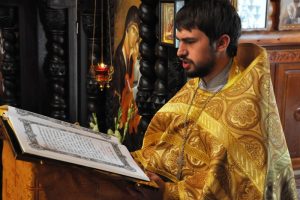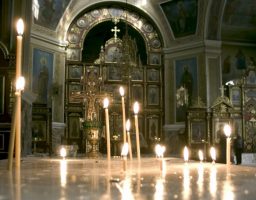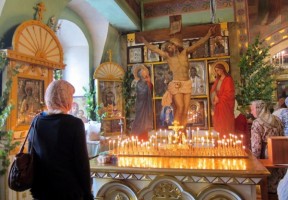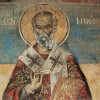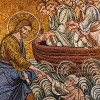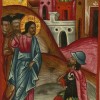There is no man that liveth and sineth not.
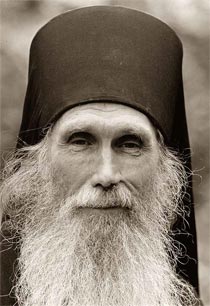 In the Name of the Father, and of the Son, and of the Holy Spirit!
In the Name of the Father, and of the Son, and of the Holy Spirit!
Christ is Risen!
Beloved brothers and sisters in Christ, one of the main questions of great importance for each and everyone is that of the afterlife. Both those who are religious and those who are indifferent to religion ponder this question. Everyone is taken up by the question of how we are going to live after our death. We believers know that there is and will be a future life, but how it will take shape and what this new life will be – all these details have not been given us to know; they are hidden from us. Nonetheless, the word of God truthfully confirms that there is a future life.
The Lord, correcting the delusion of the unbelieving Sadducees, who denied the resurrection of the dead, said to them: He is not a God of the dead, but of the living: for all live unto Him (Luke 20:38). Our earthly life is fragile, fickle, and fleeting; it can be cut short by death at any moment. Looking upon it, our inconstant and fleeting life, one cannot but feel sad when one sees how its passages are very often suddenly overshadowed by the blackest clouds of life’s storms. But it becomes even sadder when, throughout all this, one remains disconsolate. Where can one search for consolation except in the firm hope that death is not the end of it all, that an afterlife awaits us? We were created for eternal life: we all want to, and indeed will, live eternally – for Christ has abolished death by His Resurrection.
People who deny the future life and the immortality of the soul also look differently upon our present earthly life, seeking therein only pleasure and the satisfaction of sensual pleasures. Seeing the precariousness of goods and perceiving their temptations and sorrows, such people very often reach disappointment and frustration, sometimes even resorting to suicide, considering it a means of ridding themselves of all present troubles and tribulations. Forgetting about eternity, they walk in darkness, not knowing whither they go. Sometimes they indulge in bitter drunkenness and ultimately reach a bad end. For them life is a vain and chance gift, of spectral rather than actual value. [1]
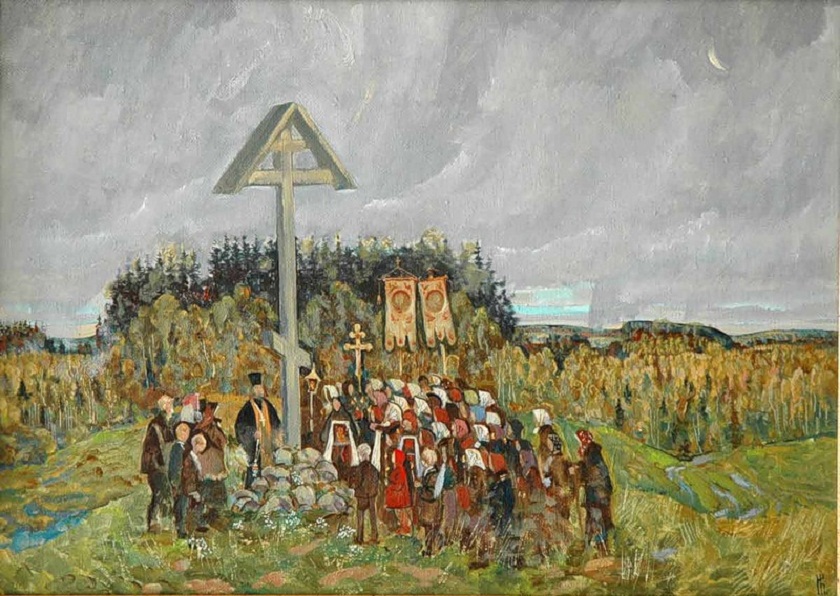 The believer, on the contrary, hopes that there is a future life. This hope, this expectation of this life, becomes the source of true comfort and reassurance. Believing in the future life as an immutable truth, dear brothers and sisters, from the most ancient times the Church has performed commemorations and prayers for those who have departed. Thus, today it has called us to offer our prayers for them and to share with them the common joy of the Risen Savior, which is why this day is called Radonitsa [from the word radost’, meaning joy]. The Lord Himself, by descending to the dead and preaching His victory over death to them, proclaimed this joy to them. The Church triumphantly celebrated the Risen Lord throughout all of Bright Week, and now hastens to share its joy in Him with the departed; it invites us, too, to proclaim this common joy to them and, at the same time, to raise our fervent prayers to the Lord for the forgiveness of the sins of the departed and for their establishment in the bright abodes of heaven.
The believer, on the contrary, hopes that there is a future life. This hope, this expectation of this life, becomes the source of true comfort and reassurance. Believing in the future life as an immutable truth, dear brothers and sisters, from the most ancient times the Church has performed commemorations and prayers for those who have departed. Thus, today it has called us to offer our prayers for them and to share with them the common joy of the Risen Savior, which is why this day is called Radonitsa [from the word radost’, meaning joy]. The Lord Himself, by descending to the dead and preaching His victory over death to them, proclaimed this joy to them. The Church triumphantly celebrated the Risen Lord throughout all of Bright Week, and now hastens to share its joy in Him with the departed; it invites us, too, to proclaim this common joy to them and, at the same time, to raise our fervent prayers to the Lord for the forgiveness of the sins of the departed and for their establishment in the bright abodes of heaven.
There is a wonderful example of how the departed share their joy in the Risen Savior with us. One Pascha a pious Elder of the Kiev-Caves Lavra went with a deacon to the caves where the departed rest. They had only just exclaimed “Christ is Risen, Fathers and Brothers!” when they heard a thunderous exclamation in response: “Truly He is Risen!”
Dear brothers and sisters! The majority of people depart into eternity with sins from which, due to the unexpectedness of death or owing to illness and infirmity, they were unable to cleanse themselves, for which reason they are guilty before God’s Justice. At the same time, we know that in the future people will be in only two places: Hades and Paradise. The departed can no longer offer prayers for the cleaning of sins on their own behalf; they cannot help their situation. They put all their hope only on those who remain in the land of the living, who can help them and change their fate in the future life. If the gates of eternity were suddenly to open before our eyes, we would see how millions of souls are holding out their hands to those living on earth, silently imploring their help in alleviating their fate in the other world.
Therefore, dear brother and sisters, harkening to the call of our own mother, the Christian Church, which implores us not to forsake our love for our neighbors after their departure from us, let us now raise our fervent prayers to the Risen Lord, asking Him to pardon our fathers and brothers who have sinned and to grant them eternal life. May our common prayer merge into a single cry unto the Lord for their pardoning. Then they, hearing this prayer for themselves, will feel our concern and love for them and be filled with mutual love for us.
Thus, my dear ones, let us now pray to the Risen Lord, that He may forgive the transgressions, voluntary and involuntary, of our departed fathers, brothers, mother, and sisters, and settle them in a place of light, a place of refreshment, with all the righteous who have pleased Him from all ages, so that our kin may now be filled with the joy of His glorious Resurrection along with us and reply to our exclamation of “Christ is Risen!” with the reply “Truly He is Risen!”
Christ is Risen!
Translator’s note:
[1] Cf. Pushkin’s poem of May 26, 1828, which begins: “A vain gift, a chance gift, / Life, why were you given me?” (To which St. Philaret of Moscow replied with a poem beginning: “Not vainly, not by chance, / Life is given me by God.”)
Translated from the Russian












